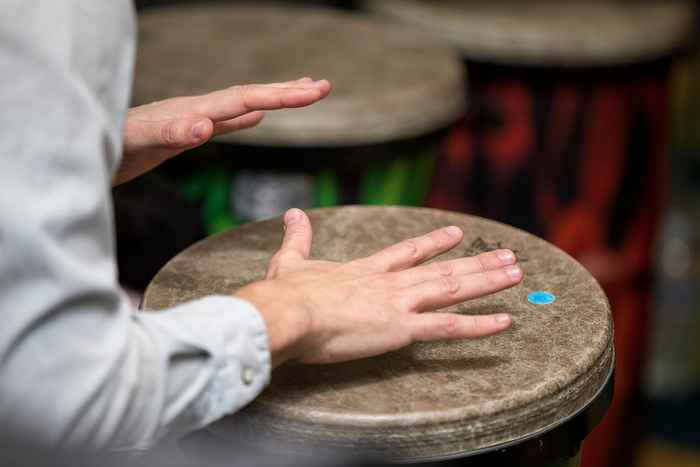Music therapy helps combat stress
7 December 2020

Previous research has shown that music can influence both physical responses and emotions. Those who listen to music show diminished cortisol values and a lower heart rate. Both are key to reducing stress. Moreover, music may suppress negative emotions such as worry, anxiety, restlessness and nervousness. Music may also enhance positive emotions, such as euphoria. All this is enough reason to mobilise the benefits of music in the fight against stress.
Music therapy
Indeed, music therapy is increasingly being used to reduce stress in patients. Its use has spread through mental health care, forensic care, nursing homes, revalidation centres and oncology wards. Specially educated and qualified music therapists use the unique qualities of music – such as melody, rhythm, tempo, dynamics and pitch – to access the emotions and memories of the patients and help them process certain experiences or influence behaviour. Music therapy does not merely involve listening to music, but also making music together and singing. The type of music is tailored to the patient in question.
Overview of 47 studies
In a earlier study, the team of scientists investigated the effects of music interventions, such as listening to and making music, on the reduction of stress symptoms. The vast majority of these interventions consisted simply of individual listening sessions, without the involvement of a qualified music therapist. In their present study, the scientists conducted a systematic analysis of studies into the effects of music therapy including a qualified music therapist in particular on both physiological stress-related arousal (elevated blood pressure, heart rate and hormone levels) and experiences of stress (anxiety, restlessness and nervousness). The result was an overview of 47 studies with a control group and involved 2,747 subjects in total.

Music therapy has a medium-sized to large effect
Based on their analysis, the researchers conclude that music therapy has a medium-to-large overall effect on stress-related outcomes and is therefore effective in reducing stress-related symptoms. In their previous study on music interventions, the researchers identified small-to-medium effects of music interventions on stress-related symptoms.
Low costs and no side effects
According to the researchers, this latest study shows that music therapy can be effective in reducing stress and justifies the increased use of music therapy by qualified music therapists in both mental and physical health care settings. Another advantage is that the costs of this type of therapy are relatively low and that there are no side effects, unlike many types of stress-reducing medication. Given the added value that qualified music therapists provide, researchers recommend that careful consideration be given to whether music therapy is necessary or music listening interventions, as already offered by many care providers, are sufficient.
Standardised music therapy protocols
Nevertheless, the researchers believe that standardised music therapy protocols and intervention descriptions are required to increase the replicability of music therapy interventions, facilitate more high-quality research into the exact stress reducing mechanisms of music therapy, and provide both patients and clinicians with more complete information.
Publication details
The study was conducted in partnership by a team of scientists from the University of Amsterdam (UvA), HAN University of Applied Sciences and the Open University (OU). Please see below for the link to the open-access publication.
‘Music therapy for stress reduction: a systematic review and meta-analysis’, in Health Psychology Review (Open Access), Martina de Witte, Ana da Silva Pinho, Geert-Jan Stams, Xavier Moonen, Arjan E. R. Bos & Susan van Hooren